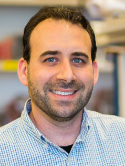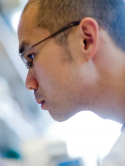Organoid cultures derived from patients with advanced prostate cancer Journal Article
| Authors: | Gao, D.; Vela, I.; Sboner, A.; Iaquinta, P. J.; Karthaus, W. R.; Gopalan, A.; Dowling, C.; Wanjala, J. N.; Undvall, E. A.; Arora, V. K.; Wongvipat, J.; Kossai, M.; Ramazanoglu, S.; Barboza, L. P.; Di, W.; Cao, Z.; Zhang, Q.; Sirota, I.; Ran, L.; MacDonald, T. Y.; Beltran, H.; Mosquera, J. M.; Touijer, K. A.; Scardino, P. T.; Laudone, V. P.; Curtis, K. R.; Rathkopf, D. E.; Morris, M. J.; Danila, D. C.; Slovin, S. F.; Solomon, S. B.; Eastham, J. A.; Chi, P.; Carver, B.; Rubin, M. A.; Scher, H. I.; Clevers, H.; Sawyers, C. L.; Chen, Y. |
| Article Title: | Organoid cultures derived from patients with advanced prostate cancer |
| Abstract: | The lack of in vitro prostate cancer models that recapitulate the diversity of human prostate cancer has hampered progress in understanding disease pathogenesis and therapy response. Using a 3D organoid system, we report success in long-term culture of prostate cancer from biopsy specimens and circulating tumor cells. The first seven fully characterized organoid lines recapitulate the molecular diversity of prostate cancer subtypes, including TMPRSS2-ERG fusion, SPOP mutation, SPINK1 overexpression, and CHD1 loss. Whole-exome sequencing shows a low mutational burden, consistent with genomics studies, but with mutations in FOXA1 and PIK3R1, as well as in DNA repair and chromatin modifier pathways that have been reported in advanced disease. Loss of p53 and RB tumor suppressor pathway function are the most common feature shared across the organoid lines. The methodology described here should enable the generation of a large repertoire of patient-derived prostate cancer lines amenable to genetic and pharmacologic studies. |
| Keywords: | clinical article; controlled study; human tissue; gene mutation; gene sequence; human cell; advanced cancer; nonhuman; cancer patient; mouse; dna repair; gene overexpression; animal experiment; animal model; gene function; tumor xenograft; protein p53; prostate cancer; dna; nucleotide sequence; prostate biopsy; fusion gene; gene loss; molecular biology; tumor gene; retinoblastoma protein; circulating tumor cell; spink1 gene; foxa1 gene; pik3r1 gene; human; male; article; chromodomain helicase dna binding protein 1 gene; organ culture; prostate cancer cell line; spop gene; tmprss2 erg fusion gene |
| Journal Title: | Cell |
| Volume: | 159 |
| Issue: | 1 |
| ISSN: | 0092-8674 |
| Publisher: | Cell Press |
| Date Published: | 2014-09-25 |
| Start Page: | 176 |
| End Page: | 187 |
| Language: | English |
| DOI: | 10.1016/j.cell.2014.08.016 |
| PROVIDER: | scopus |
| PUBMED: | 25201530 |
| PMCID: | PMC4237931 |
| DOI/URL: | |
| Notes: | Export Date: 3 November 2014 -- Molecular Sequence Numbers: GENBANK: GSE60612; -- Source: Scopus |
Altmetric
Citation Impact
BMJ Impact Analytics
MSK Authors
-
 228
228Sawyers -
 142
142Laudone -
 254
254Slovin -
 587
587Morris -
 672
672Scardino -
 136
136Chen -
 261
261Touijer -
 177
177Chi -
 421
421Gopalan -
 11
11Arora -
 431
431Solomon -
 276
276Rathkopf -
 543
543Eastham -
 11
11Iaquinta -
 144
144Carver -
 51
51Wongvipat -
 1133
1133Scher -
 156
156Danila -
 5
5Wanjala -
 20
20Ran -
 22
22Cao -
 6
6Sirota -
 28
28Gao -
 4
4Vela -
 2
2Zhang -
 5
5Dowling -
 1
1Barboza -
 12
12Curtis -
 3
3Di -
 3
3Undvall
Related MSK Work



